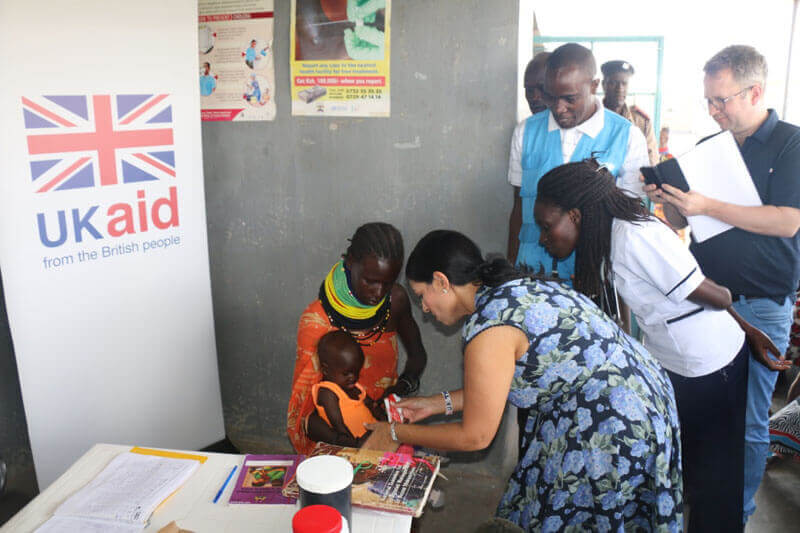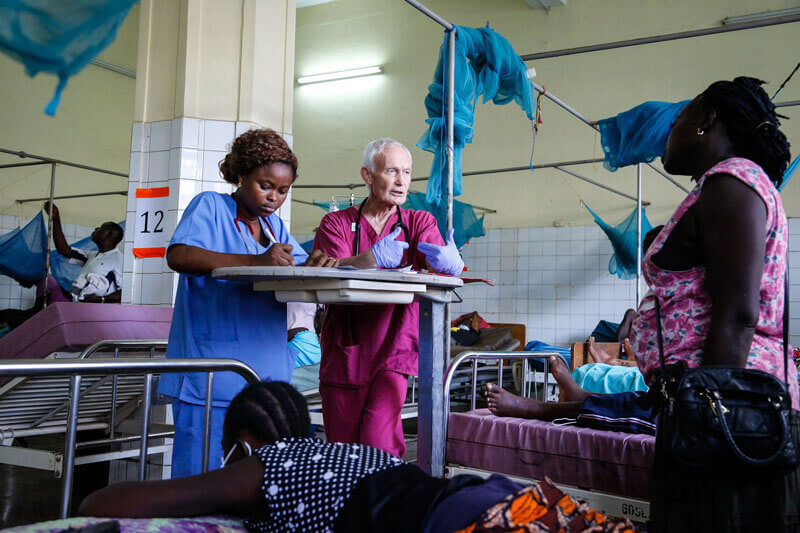 Priti Patel visits dispensary in Togo. Photo: Rob Oxley/DFIDLast week, the United Kingdom’s (UK) Department for International Development (DFID) released it’s first-ever research review, laying out a vision for how it will invest £390 million in research and technology per year over the next four
years to tackle the world’s toughest challenges—including committing £357 million to support research and development (R&D) for infectious
diseases through the Ross Fund.
Priti Patel visits dispensary in Togo. Photo: Rob Oxley/DFIDLast week, the United Kingdom’s (UK) Department for International Development (DFID) released it’s first-ever research review, laying out a vision for how it will invest £390 million in research and technology per year over the next four
years to tackle the world’s toughest challenges—including committing £357 million to support research and development (R&D) for infectious
diseases through the Ross Fund.
DFID’s new head Priti Patel released the review during a speech at the annual Grand Challenges Meeting in London. The occasion marked the first time Patel has provided public detail on her plans to prioritize research
during her tenure.
What does the review do?
The review sets out a to-do list for DFID and provides details on how the department will target ongoing investments in research and technology to tackle
development challenges. Notable highlights from the review include commitments to:
- Continue to invest 3 percent of the annual DFID budget in research.
- Spend an average of ₤390 million per year over the next four years on research, including a ₤357 million investment on research on infectious diseases
through the new Ross Fund.
- Coordinate across the government and with other stakeholders to ensure UK development to maximize the impact of research investments.
A key theme throughout the review is the importance of high quality research to drive better development outcomes and value for money. Highlighted among
the review findings is the high return on investment of DFID’s R&D activities, which are expected to deliver an annual internal rate of return
of 10 percent across the portfolio. One priority development outcome outlined by DFID is using research to understand how to build foundations for
economic development in low and middle income countries—including through trade, innovation and private-sector growth—shedding light on
Patel’s vision for using her budget to spur future trade. During the announcement of the review, Patel also noted that, “As countries develop and leave
aid dependency behind they will increasingly turn to the UK, not for financial resources, but for its intellectual leadership and scientific expertise.”
Role of the Ross Fund
 Priti Patel visits dispensary in Togo. Photo: Rob Oxley/DFIDA major priority outlined in the review will be scaling up the UK’s commitment to accelerate the development of new technologies to eliminate infectious
diseases through the Ross Fund. Announced last year and laid out in the UK’s new AID Strategy, the Ross Fund is a cross-government portfolio of programs made up of both new and existing global health R&D
projects. As currently laid out, the Ross Fund will focus on the development of new health technologies to combat serious diseases in developing countries,
including antimicrobial resistance, emerging diseases with epidemic potential, and neglected tropical diseases that threaten more than one billion
people. As the fund is co-managed by both DFID and the Department of Health, questions remain around the role it will play in prioritization of new
investments and coordination of projects across the government.
Priti Patel visits dispensary in Togo. Photo: Rob Oxley/DFIDA major priority outlined in the review will be scaling up the UK’s commitment to accelerate the development of new technologies to eliminate infectious
diseases through the Ross Fund. Announced last year and laid out in the UK’s new AID Strategy, the Ross Fund is a cross-government portfolio of programs made up of both new and existing global health R&D
projects. As currently laid out, the Ross Fund will focus on the development of new health technologies to combat serious diseases in developing countries,
including antimicrobial resistance, emerging diseases with epidemic potential, and neglected tropical diseases that threaten more than one billion
people. As the fund is co-managed by both DFID and the Department of Health, questions remain around the role it will play in prioritization of new
investments and coordination of projects across the government.
R&D in the context of BREXIT
While DFID has proven itself as a world leader in global health R&D, the new era of Brexit has raised questions among advocates and politicians alike
about how DFID’s development activities might be impacted and how the UK will maintain its reputation as a global leader in science and technology
innovation. Over the summer, the UK Parliament’s Science and Technology Committee conducted an inquiry exploring the implications of Brexit on the UK’s science and technology activities and ongoing relationships with international
research institutes. Valid concerns, like how the UK will continue to attract top scientific talent and how the research community will remain strong
without investment from the European Union (EU), are still unanswered.
While many questions still remain—and the UK has yet to declare Article 50, which officially initiates the process to separate from the EU—all
signals point to the fact that the UK plans to honor its longstanding commitment to aid and continue to make critical contributions to advancing science
and technology. In her first round of parliamentary questions since taking over as head of DFID, Patel reaffirmed the UK’s commitment to spend 0.7 percent of GDP on
aid. Additionally, the research review signals that DFID is intent on playing its part to ensure that the UK remains a leader in innovative research
to advance global health.
What’s next?
The research review marks the first of a series of reviews that DFID will be releasing. In the coming weeks, DFID is expected to release a multilateral
aid review, a bilateral aid review, and a civil society partnership review, shedding further light on how its aid budget is being spent and what ongoing
priorities will be for the department.


